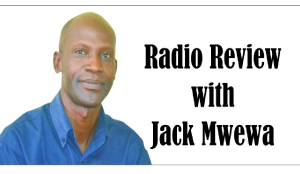 NECHIPELA Inkula naco chilatusha, a bemba saying goes to mean that (Even that which grinds, needs rest), were remarks of ZNBC’s Radio 1, bakabusha, Kayula Chasaya when he learnt this column had taken a break.
NECHIPELA Inkula naco chilatusha, a bemba saying goes to mean that (Even that which grinds, needs rest), were remarks of ZNBC’s Radio 1, bakabusha, Kayula Chasaya when he learnt this column had taken a break.
Mr Eustace Nkandu from the Independent Broadcasting Authority (IBA) wondered why this column missed in the Sunday Times for the past eight weeks.
Karen Nakawala, presenter of Sunday Mellow Madness on Radio Phoenix asked whether the columnist had abandoned this space.
From Chingola, I wave Radio station manager Lucy Kaonga Sichela thought that someone else could have kept the column running than breaking this notification forum of the weekly flow of events on radio.
Valentine Mukuka from Radio Icengelo said this column compelled him to buy the Sunday Times in order for him to be in touch with day-to-day activities on the airwaves.
Collins Kasalamuna from ZNBC’s Radio 1 in Kitwe considers this column a forum through which both radio presenters and listeners reflect the level of professionalism on air.
Julius Phiri, a Chipata-based journalist said radio fans in that region kept ablest of what was happening on the Copperbelt and Lusaka through this column.
Paddy Mukando of Radio Phoenix visited Ndola on a Saturday and assured he was going to be on air the following morning, he too missed this column.
Edward Lange, who is Southern Africa Resource Watch country coordinator jokingly, asked whether either the author or the column had ‘died’ a natural death.
A lot of things happened on radio during that break; Zambia celebrated her golden jubilee, President Michael Sata died and was interred, Chipolopolo struggled to qualify for 2015 AFCON, the political hullaballoo and many other events.
Suffice to say that most of those events received reasonable share of coverage across radio stations, the golden jubilee events, were, however, adequately covered going by the narrations radio presenters gave out.
Most presenters were able to give out valuable information about Zambia’s independence and played voices of some freedom fighters.
Such ample information flew on most radio stations, because presenters either researched adequately or could have overwhelmed themselves with details that were available everywhere.
Radio presentation becomes exciting when presenters know what they are talking about and have enough information to share with the listeners.
 President Sata’s death and burial received exceptional coverage on most radio stations; this was so because of the information provided by people who personally knew him.
President Sata’s death and burial received exceptional coverage on most radio stations; this was so because of the information provided by people who personally knew him.
There were instances when late president’s family members featured on some radio programmes to give first- hand accounts of Mr Sata.
Some ordinary citizens were heard live on radio detailing their encounters with Mr Sata, it was such presentation that authenticated the information about the man we were mourning.
Zambia national soccer team, otherwise known as Chipolopolo’s campaign for Equatorial Guinea 2015 Africa Cup of Nations (AFCON) came live on radio.
Radio Icengelo has been consistent in broadcasting even from places where the national broadcaster fails.
Amos Lombe was live from Cape Verde on FM 102.9 giving second-to-second running commentaries when Zambia played in that country’s capital Praia at Estadio Nacionale.
Listeners, more especially those in rural areas look forward to more of such live commentaries when the 2015 AFCON tournament heats up next month.
On the political front, almost all radio stations have taken advantage of the current political wind blowing across the country, featuring presidential hopefuls who are sharing their visions to electorate.
It is in such moments when community radio stations have become convenient as presidential hopefuls utilise them in their locations.
Convenient in the sense that every presidential hopeful has at least found time to feature on a community radio station in rural areas they have visited so far.
The said trend is benefiting both parties; the radio station would advertise to be featuring a visiting presidential candidate, while the candidate on the other hand has an opportunity to reach out and interact with local people.
Interestingly, we have not heard of any report when cadres stormed a radio station to ‘sort’ out political rivals as it has been in the past.
Radio stations have in the past been turned into battle fields when opposing cadres waylaid descending voices they heard live on air, call it political maturity or simply appreciating media houses.
Stay tuned, don’t touch that dial! – jackmwewa@gmail.com 0955115777






